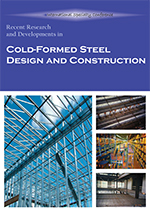Session Dates
24 Aug 2012 - 25 Aug 2012
Abstract
Novel cold-formed steel (CFS) elements are investigated in this paper for seismic resistant multi-storey moment frames. Premature local buckling and low out-of-plane stiffness are known as the main structural deficiencies of CFS sections with thin-walled elements. These lead to low energy dissipation capacity of the structures made up of CFS sections as the main load bearing members in seismic events. In order to improve the energy dissipation capacity of CFS members, an innovative CFS beam section with curved flanges is developed by numerical FE analysis and experimental work. A web bolted through plate CFS beam-column connection is used to limit out-of-plane actions in transferring the beam forces to column faces. This type of connection, however, produces premature web buckling and needs to be strengthened by a combination of vertical and horizontal out-of-plane stiffeners. Six beam-column connection assemblies including different stiffener configurations were tested. It is shown that the ductility factor and the moment strength are increased by up to ~75% and ~35% respectively relative to the specimen without stiffener. Correspondingly, activation of connection slip leads to a highly stable hysteretic behaviour and a significant increase (up to ~240%) in the hysteretic energy dissipation capacity.
Department(s)
Civil, Architectural and Environmental Engineering
Research Center/Lab(s)
Wei-Wen Yu Center for Cold-Formed Steel Structures
Meeting Name
21st International Specialty Conference on Cold-Formed Steel Structures
Publisher
Missouri University of Science and Technology
Document Version
Final Version
Rights
© 2012 Missouri University of Science and Technology, All rights reserved.
Document Type
Article - Conference proceedings
File Type
text
Language
English
Recommended Citation
Sabbagh, Alireza Bagheri; Petkovski, Mihail; Pilakoutas, Kypros; and Mirghaderi, Rasoul, "Novel Cold-formed Steel Elements for Seismic Applications" (2012). CCFSS Proceedings of International Specialty Conference on Cold-Formed Steel Structures (1971 - 2018). 2.
https://scholarsmine.mst.edu/isccss/21iccfss/21iccfss-session11/2
Novel Cold-formed Steel Elements for Seismic Applications
Novel cold-formed steel (CFS) elements are investigated in this paper for seismic resistant multi-storey moment frames. Premature local buckling and low out-of-plane stiffness are known as the main structural deficiencies of CFS sections with thin-walled elements. These lead to low energy dissipation capacity of the structures made up of CFS sections as the main load bearing members in seismic events. In order to improve the energy dissipation capacity of CFS members, an innovative CFS beam section with curved flanges is developed by numerical FE analysis and experimental work. A web bolted through plate CFS beam-column connection is used to limit out-of-plane actions in transferring the beam forces to column faces. This type of connection, however, produces premature web buckling and needs to be strengthened by a combination of vertical and horizontal out-of-plane stiffeners. Six beam-column connection assemblies including different stiffener configurations were tested. It is shown that the ductility factor and the moment strength are increased by up to ~75% and ~35% respectively relative to the specimen without stiffener. Correspondingly, activation of connection slip leads to a highly stable hysteretic behaviour and a significant increase (up to ~240%) in the hysteretic energy dissipation capacity.



